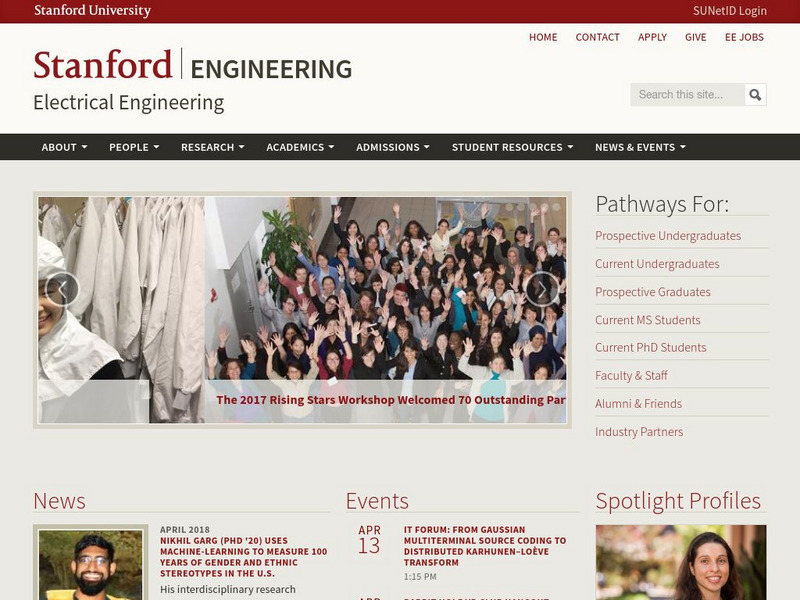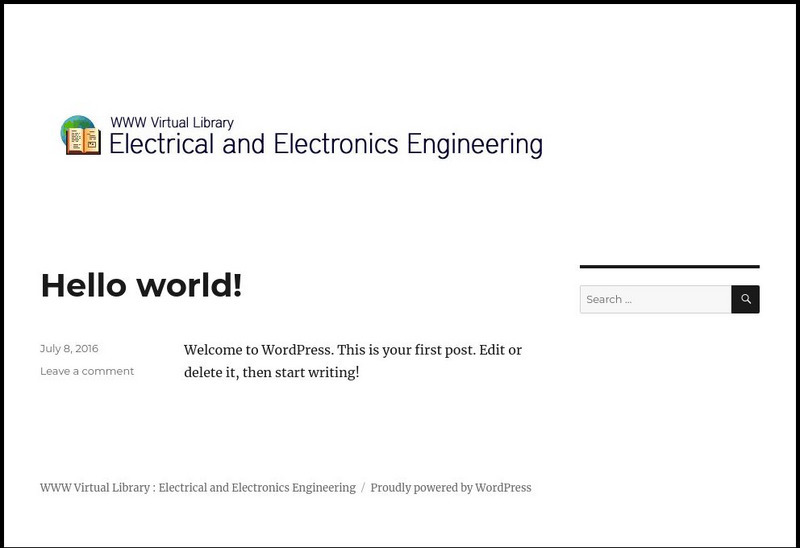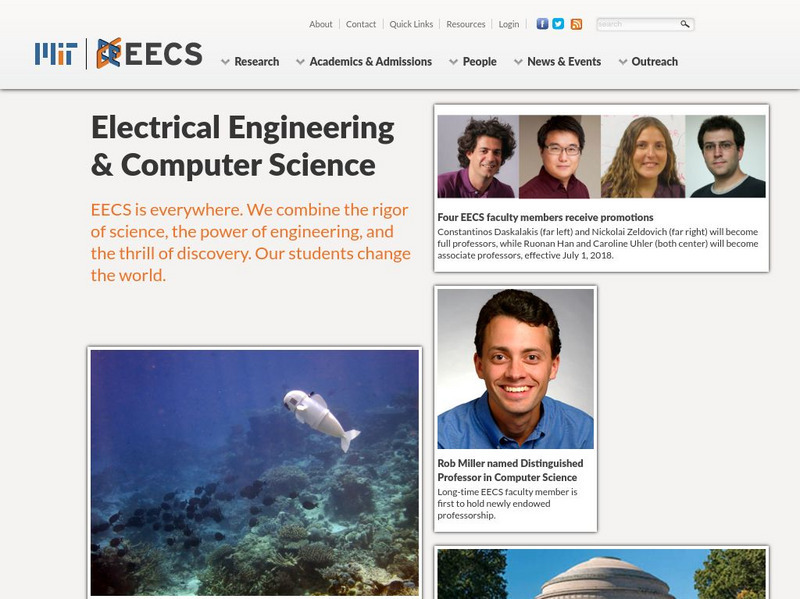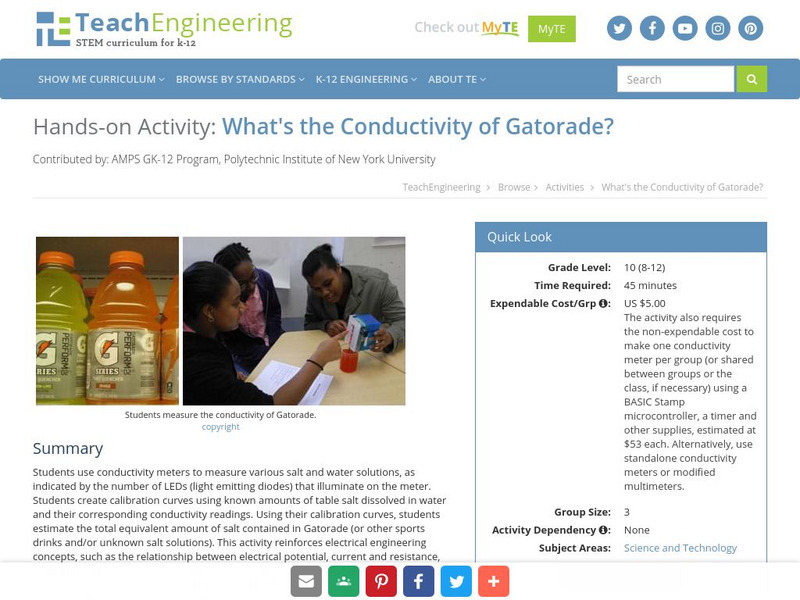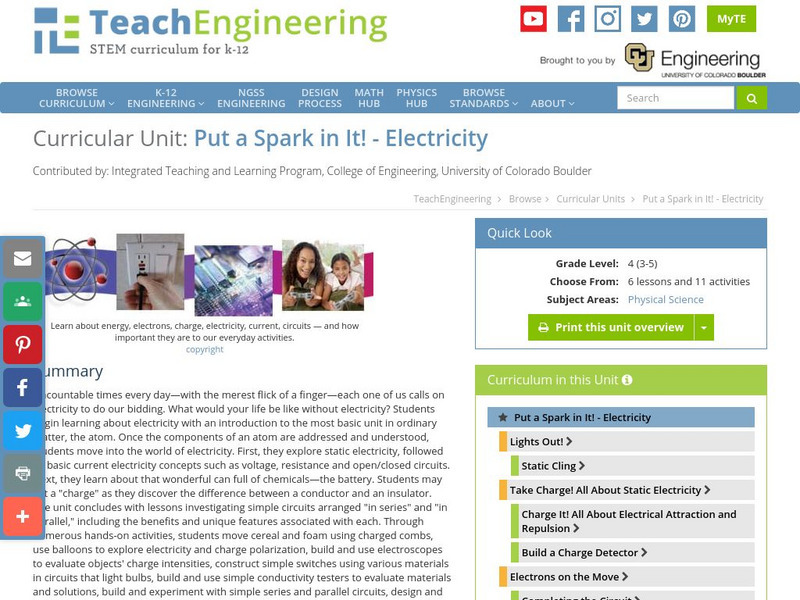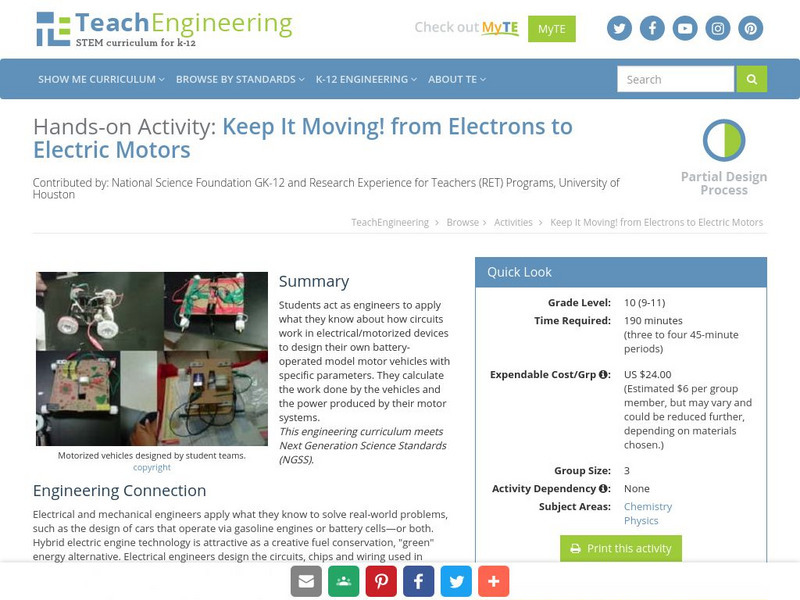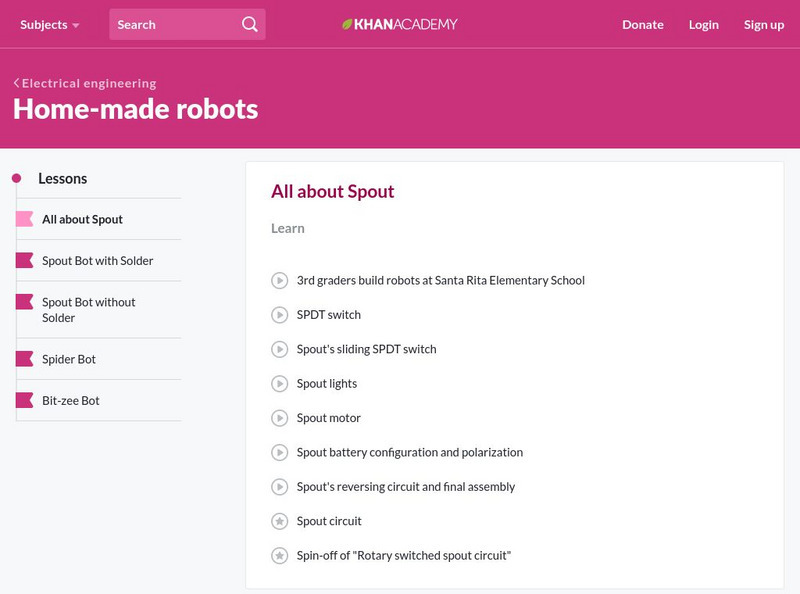Career Cornerstone Center
Sloan Career Cornerstone Center: Electrical Engineering
A career in Electrical Engineering is profiled.Included: Electrical Engineering overview, Preparation, Day In The Life, Earnings, Employment, Career Path Forecast, Professional Organizations.
Stanford University
Stanford University Department of Electrical Engineering
This is the homepage of the Stanford University of Department of Electrical Engineering. There are links to information on research, academics, seminars, faculty, etc.
Stanford University
Stanford University Department of Electrical Engineering
This is the homepage of the Stanford University of Department of Electrical Engineering. There are links to information on research, academics, seminars, faculty, etc.
Other
The Electrical Engineering Virtual Library
This site has links to various topics about electrical engineering. These include institutions, resources, journals, etc.
Massachusetts Institute of Technology
Mit: Department of Electrical Engineering and Computer Science
This is the website for the Massachusetts Institute of Technology's Department of Electrical Engineering. The site has links to research, academics, etc.
Massachusetts Institute of Technology
Mit: Open Course Ware: Courses: Electrical Engineering: Circuits and Electronics
College-level electrical engineering course highlighting circuits and electronics. This course introduces the fundamentals of the lumped circuit abstraction. Course features include video lectures, suggested readings, labs, lecture...
Khan Academy
Khan Academy: Electrical Engineering: Introduction
Some basic concepts to introduce the electrical engineering course. Become familiar with engineering numbers and notation, and learn about the two most important electrical quantities: current and voltage.
Cosmo Learning
Cosmo Learning: Applied Science and Technology 210: Electrical Engineering
A collection of video lectures from a course that explores the application of electrical engineering topics. Webpage includes twenty-eight lectures from a professor at the University of California, Berkeley. Lectures vary in length and...
TeachEngineering
Teach Engineering: What's the Conductivity of Gatorade?
Students use conductivity meters to measure various salt and water solutions, as indicated by the number of LEDs (light emitting diodes) that illuminate on the meter. Students create calibration curves using known amounts of table salt...
Other
Beginner's Guide to Measurement in Electronic and Electrical Engineering [Pdf]
The National Physical Laboratory, which is the UK's National Measurement Institute, offers a Beginner's Guide to Measurements in Electronics and Electrical Engineering. Discusses how electric currents are measured and offers images.
Khan Academy
Khan Academy: Electrical Engineering: Electrostatics
Electrostatics is the study of forces between charges, as described by Coulomb's Law. We develop the concept of an electric field surrounding charges. We work through examples of the electric field near a line, and near a plane, and...
Khan Academy
Khan Academy: Electrical Engineering: Circuit Analysis
Circuit analysis is the process of finding all the currents and voltages in a network of connected components. We look at the basic elements used to build circuits, and find out what happens when elements are connected together into a...
TeachEngineering
Teach Engineering: Put a Spark in It! Electricity
Uncountable times every day "with the merest flick of a finger"each one of us calls on electricity to do our bidding. What would your life be like without electricity? Students begin learning about electricity with an introduction to the...
TeachEngineering
Teach Engineering: Simple Coulter Counter
Students build and use a very basic Coulter electric sensing zone particle counter to count an unknown number of particles in a sample of "paint" to determine if enough particles per ml of paint exist to meet a quality standard. In a lab...
TeachEngineering
Teach Engineering: Particle Sensing: The Coulter Counter
Students are presented with a short lesson on the Coulter principle, an electronic method to detect microscopic particles and determine their concentration in fluid. Depending on the focus of study, students can investigate the...
TeachEngineering
Teach Engineering: Keep It Moving! From Electrons to Electric Motors
Students act as engineers to apply what they know about how circuits work in electrical/motorized devices to design their own battery-operated model motor vehicles with specific paramaters. They calculate the work done by the vehicles...
TeachEngineering
Teach Engineering: Graphing Your Social Network
Students analyze their social networks using graph theory. They gather data on their own social relationships, either from Facebook interactions or the interactions they have throughout the course of a day, recording it in Microsoft...
Massachusetts Institute of Technology
Mit: Open Course Ware: Courses: Introduction to Electric Power Systems
College-level electrical engineering course highlighting electric power systems. Course introduces electric power and the conversion of electrical to mechanical energy. Course features include readings, assignments, and quizzes.
TeachEngineering
Teach Engineering: The Power of Food
Students imagine they are stranded on an island and must create the brightest light possible with the meager supplies they have on hand in order to gain the attention of a rescue airplane.
Khan Academy
Khan Academy: Electrical Engineering: Home Made Robots
Use these tutorials to start some robotics projects with Spout, Spider, and Bit-zee bots.
Massachusetts Institute of Technology
Mit: Open Course Ware: Introduction to Numerical Analysis for Engineering
College-level electrical engineering course highlighting numerical analysis for engineers. This course introduces students to the formulation, methodology, and techniques for numerical solution of engineering problems. Course features...
Texas Instruments
Texas Instruments: Ee*pro? App
Students use this App to study concepts for Electrical Engineering coursework.
Khan Academy
Khan Academy: Electrical Engineering: Semiconductor Devices
An explanation of diodes as they relate to semi conductor devices.
TeachEngineering
Teach Engineering: Organic Solar Energy and Berries
Students learn about how a device made with dye from a plant, specifically cherries, blackberries, raspberries and/or black currents, can be used to convert light energy into electrical energy. They do this by building their own organic...

